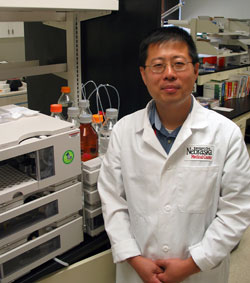 |
Dong Wang, Ph.D. |
The technology developed in the laboratories of Dr. Wang, assistant professor of pharmaceutical science in the UNMC College of Pharmacy, and Richard Reinhardt, Ph.D., professor in the UNMC College of Dentistry, could be incorporated into oral rinses, toothpaste, chewing gum, breath mints and topical creams. Dr. Wang also hopes it could be used for the treatment of osteoporosis.
Dr. Wang is among dozens of UNMC inventors who will be recognized Aug. 23 for their new inventions, patents and licensed technologies at UNeMed’s 2007 Innovation Awards. The campus is invited to the 4 p.m. ceremony in the Durham Research Center Auditorium. A reception will follow in the DRC Atrium.
“Dr. Wang and his colleagues have developed an elegant drug-delivery system that selectively targets biomineral elements of the body and could deliver a multitude of drugs to these locations,” said Jack Hartwigsen, Ph.D., senior licensing associate for UNeMed Corporation, the marketing and licensing arm for UNMC. “This technology has consequently generated significant interest from industry.”
The novel drug delivery system offers the ability to deliver biologically active agents via a cyclodextrin conjugate that targets and selectively binds to teeth and bones. The agent delivered can be released slowly over time thus increasing the therapeutic index and overall performance of the agent.
“The major advantage of the invention over the traditional formulation is that it offers a very simple mechanism of drug retention in the oral cavity,” Dr. Wang said.
Dr. Wang also hopes the research will have treatment applications for patients with osteoporosis.
“If you can develop a bone anabolic therapy targeted only to the bone then you have a winner,” he said. “Most of the troubling side effects will be gone and you will have much better patient compliance.”
In studying the new delivery system, Dr. Wang’s team discovered that the bone-targeting cyclodextrin conjugate itself generated bone, a finding they don’t yet understand, but are excited to explore.
“We found that the carrier thought to be biologically inert could also, in fact, generate new bone, which has never been reported before,” he said.
Many of the current therapies for osteoporosis, including bisphosphonates, work by inhibiting the osteoclasts, or bone diggers that resorb bone, creating thinner, more fragile bones.
Rather than inhibiting the bone diggers, Dr. Wang’s cyclodextrin conjugate seems to stimulate the osteoblasts, or builders responsible for bone formation. “We are now trying to figure out how it works,” he said.
Dr. Wang’s research team has four New Invention Notifications (NINs) that have resulted in the filing of three provisional patents and one international patent application (PCT) covering several variations of the conjugates and their synthesis, Dr. Hartwigsen said.
In addition, the Technology Advancement Group (TAG), an NRI-supported core facility supported by the office of the vice chancellor for research, has provided funds and resources to continue this research. “The financial assistance provided by TAG has allowed Dr. Wang and his collaborators to develop and complete experiments which make the technology more attractive to industry,” said Michael Dixon, Ph.D., director of intellectual property for UNeMed. “Investment in early-stage technologies is critical to adding value and the assistance provided by TAG may be the key to convincing a company to partner with us on further development and commercialization.”
“I am fortunate to be able to work on these projects with Dr. Xin-Ming Liu in my lab and Dr. Richard Reinhardt from the College of Dentistry,” Dr. Wang said. “We truly synergize as a team.”
“Dr. Wang has been extremely helpful throughout the entire process of disclosing, patenting and marketing his technologies,” Dr. Hartwigsen said. “There have been numerous instances where he has assembled needed information on very short notice. I’ve truly enjoyed my interactions with him.”
Dr. Wang credits the support of UNeMed in helping him strengthen his research data.
“They’ve been very supportive,” he said. “When researchers have new ideas they need to be proactive and approach UNeMed for their intellectual property protection and, if the invention has strong merit, seed money to support further development of the idea.”
Dr. Wang plans additional studies to determine the systemic bone anabolic effect of the cyclodextrin conjugate.
“New research findings and breakthroughs are sometimes accidental — that’s the beauty of science,” he said. “You would find something totally unexpected. It’s exciting.”